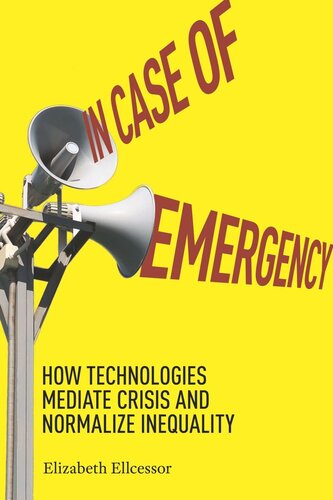

Most ebook files are in PDF format, so you can easily read them using various software such as Foxit Reader or directly on the Google Chrome browser.
Some ebook files are released by publishers in other formats such as .awz, .mobi, .epub, .fb2, etc. You may need to install specific software to read these formats on mobile/PC, such as Calibre.
Please read the tutorial at this link: https://ebookbell.com/faq
We offer FREE conversion to the popular formats you request; however, this may take some time. Therefore, right after payment, please email us, and we will try to provide the service as quickly as possible.
For some exceptional file formats or broken links (if any), please refrain from opening any disputes. Instead, email us first, and we will try to assist within a maximum of 6 hours.
EbookBell Team

4.4
102 reviewsA much-needed look at the growth of emergency media and its impact on our lives
In an emergency, we often look to media: to contact authorities, to get help, to monitor evolving situations, or to reach out to our loved ones. Sometimes we aren’t even aware of an emergency until we are notified by one of the countless alerts, alarms, notifications, sirens, text messages, or phone calls that permeate everyday life. Yet most people have only a partial understanding of how such systems make sense of and act upon an “emergency.” In Case of Emergency argues that emergency media are profoundly cultural artifacts that shape the very definition of “emergency” as an opposite of “normal.” Looking broadly across a range of contemporary emergency-related devices, practices, and services, Elizabeth Ellcessor illuminates the cultural and political underpinnings and socially differential effects of emergency media.
By interweaving in-depth interviews with emergency-operation and app-development experts, archival materials, and discursive and technological readings of hardware and infrastructures, Ellcessor demonstrates that emergency media are powerful components of American life that are rarely, if ever, neutral. The normalization of ideologies produced and reinforced by emergency media result in unequal access to emergency services and discriminatory assumptions about who or what is a threat and who deserves care and protection. As emergency media undergo massive growth and transformation in response to digitization and attendant entrepreneurial cultures, Ellcessor asks where access, equity, and accountability fit in all of this. The first book to develop a typology of emergency media, In Case of Emergency opens a much-needed conversation around the larger cultural meanings of “emergency,” and what an ethical and care-based approach to emergency could entail.